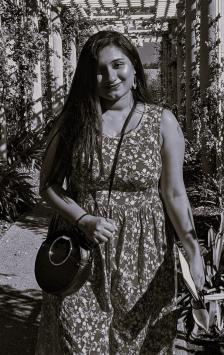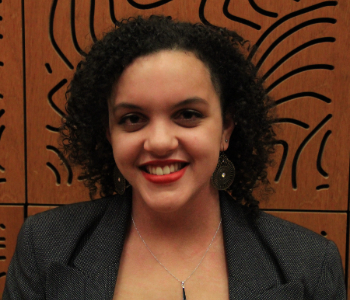Research Cafe: Pritha Mukherjee & Julie Aromi
Event Description
Research Cafe: April 17, 2024
3:00 - 4:00pm
On Zoom
Register in advance to receive the Zoom link
1.) "Reconstructing Heritage: A History of Archaeological Collections in Provincial Museums of Eastern India" by Pritha Mukherjee

Abstract: My dissertation takes the creation of the Bihar Museum in India as a point of departure to interrogate the processes behind production of regional cultural heritage in Eastern India since the 1940s. In this presentation, I will be talking about how the Museum’s function as a modern archaeological museum signals a new age in museum-making in South Asia. Emerging out of the confluence of identity politics, the global Buddhist revival, as well as the hypernationalist heritage movement in India, the Bihar Museum has been touted as an international-level museum with star architects behind its design. The talk will feature three sections: historical background of museum constructions in Eastern India, the sociohistorical processes behind construction of the new Bihar Museum, and the wider national and international impact of its construction. I investigate the roles of new museums in reorganizing cultural heritage sites and what this radical reconstruction of an archaeological collection in service of regional nationalism tells us about the state of contemporary museology in South Asia more broadly.
Speaker Bio: Pritha Mukherjee is a 4th year PhD Candidate at the Department of Art History, Rutgers-New Brunswick and a Rutgers Presidential Fellow (2019-2024). Her dissertation explores the creation of archaeological collections in South Asia in twentieth century through contemporary times, and the politics of their popular representations in light of current sociopolitical developments. She has an MA in Historical Studies from Nalanda University, India, and a BSc (Hons) in Chemistry from Presidency University, India. Pritha has worked as a field investigator in the Rajgir Archaeological Survey Project (RASP) and done field surveys in north India and Nepal. Her work in public history includes her stints as a Walk Consultant with Rajgir Heritage Walk and a Research and Development Associate with Immersive Trails Pvt Ltd. She has researched and developed walking tours around the city of Kolkata and led public history workshops with Goethe Institut and British Council.
2.) "Archives and the Shape of a Story: An Analysis of NYC Archives’ Approaches to Preserving the 1991 Crown Heights Riot" by Julie Aromi

Abstract: New York City is home to a variety of archives, housed by institutions which pursue different missions, have access to different sources of funding, employ different staffing arrangements, and exhibit different allegiances to archival standards. These neighborhing institutions often collect materials about the same local events, resulting in collections that can tell very different stories. This presentation is an investigation of several archives’ collections surrounding one such event, the 1991 riot in Crown Heights, Brooklyn. Using principles of content analysis and critical archival studies, this presentation explores the process of finding, connecting with, and using archives administered by universities, local historical and community societies, public libraries, and municipal governments. It is an investigation of each institution’s priorities, mission and orientation, and the context in which collection, dissemination, and research happens. Part of a larger project examining the relationship of the archival to the historiographical, this is one facet of a case study that uses the Crown Heights riot to investigate archival and historical practice around events where public and archival memory are starkly racialized. Using each archive’s online presence, collection information and paratexts, and reference interviews with archival staff, this paper seeks not to tell the story of the riot, but rather the story of the institutions which have chosen to collect about it (and by extension, those which have chosen not to). This is a rumination on silences and exclusion, budgets and institutions, the responsibilities local institutions have to their city’s history, and ultimately, the relationship among the archive, archivists, events, and researchers.
Speaker Bio: Julie Aromi is a doctoral candidate in Library and Information Science and Media Studies in the School of Communication and Information. Her work investigates the flows of power from the archive to the public, and the ways that history is shaped and constructed. She holds a BA in sociology and African American studies from Princeton University, a Master of Library and Information Science, and a Master of History, both from Queens College (CUNY). She works as a fellowship advisor at GradFund, and does organizing work with the AAUP-AFT union.
About Research Cafe
Research Café brings together the entire graduate student community of Rutgers University-New Brunswick/Piscataway campus to strengthen scholarly literacy and interdisciplinary research communication by providing a platform for budding researchers to connect, share their in-progress research or scholarship, and benefit from peer feedback in a friendly and low-stakes setting.
Research Café is a monthly, one-hour event occurring on Zoom for the Spring 2024 semester. Each event will feature:
- Presentations (10-12 min. each) from two graduate students from across disciplinary areas ranging from engineering and biology to history and anthropology.
- A Q&A dialogue with peers and attendees.
Sign up to attend in person or on Zoom at https://grad.rutgers.edu/research-cafe.
---
Questions? Contact Briana Bivens at bb770@grad.rutgers.edu.